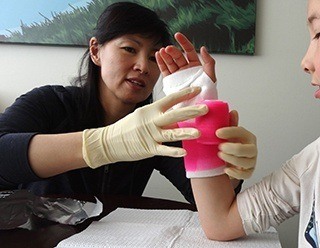Cast/Splint application

Casting and splinting are the commonly rendered non-surgical treatment options for injuries related to the bones and soft tissues (muscles, tendons, ligaments). Casting and splinting help stabilize bones and joints, and reduce pain and swelling.
Casts and splints can be made of plaster, fiberglass, or custom fabricated by a hand therapist using a type of moldable plastic. Some splints can be purchased over the counter, or off the shelf from our office. How often to use a splint, or how long a cast is required depends on the condition being treated, the extent of the injury, your age and skeletal health, among other things. There is no simple recipe for this type of treatment, despite how common it is. Dr. Yu will discuss your condition with you, and determine if casting or splinting is appropriate.
Post Casting/Splinting Care
If you are being treated with a splint or cast for an injury, it is important that you keep your hand elevated to reduce swelling. Swelling when in a splint, or even more so in a cast, can lead to complications from increased pressure on your skin or compressing your blood vessels. Applying ice, and keeping the hand above the level of your heart will reduce these risks.
It is quite normal to feel some pressure under your splint or cast, especially right after it is applied. However, if you experience increased pain, tightness, numbness, tingling, burning, or swelling you should contact your doctor immediately. Do not attempt to cut your cast off yourself. If you are having discomfort from your cast, you will be seen quickly.
Plaster casts must be kept dry at all times. Getting a plaster cast wet will cause it to lose its strength, not to mention develop an unwanted odor. If your cast gets wet, call the office immediately to make an appointment to have it changed. Technically, fiberglass can get wet without adverse consequences. However, the most common padding used even under fiberglass is cotton, and this cotton padding must stay dry. If you know that you will be in a situation where your cast might get wet, ask for water proof padding, which may be available, at an additional charge.
It is very common to experience itching under the cast. You must resist the temptation to stick something under the cast to scratch. Not only do you risk cutting your skin by doing this (and thereby risk developing an infection), but this usually results in more itching! Go for a walk, call a friend, or listen to some music to take your mind off the itching. (I apologize if reading this paragraph has suddenly made you itchy!)




